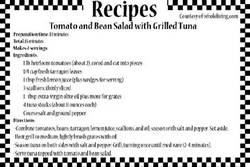University students know that there is nothing like starting the day with a fresh cup of coffee and bagel toasted with cream cheese from Einstein’s. Likewise, there is nothing like going out late night to McDonald’s for the one dollar Big Mac special. While these indulgences are great in the moment, do you ever feel like afterwards you have a tough time concentrating on your work, and overall feel fatigued? Chances are it is due to the tough time your body is having digesting that coffee, bagel, and Big Mac combo. According to justeatthis.com, everything you put in your body has a chemical effect, which is why food affects your mood.
“Good Food Good Mood” an article from Be Smart, Eat Smart, Live Smart online, states that eating under stress can cause digestive disorders and avoiding fat, especially oils, can cause hormonal imbalances that result in irritability and quick tempers. With hectic schedules and living away from home, college students commonly make these mistakes and as a result, their stress levels increase and good moods decrease. The secret to feeling better: good mood foods. Good mood foods provide the key ingredients to a happy personality, and allow for a much healthier lifestyle.
Without certain key nutrients our bodies do not know how to function and feel deprived.
When we eat the right meals, our mood has the potential to improve, thus allowing for a successful day. This is something that we have all learned in our basic science classes, but tend to disregard and cave into our cravings instead.
Justeatthis.com suggests incorporating “mood supporters” into your diet such as vegetables, fruits, fish, nuts, beans, nonfat dairy products, egg whites, and whole grains for vital nourishment. These foods provide nutrients that support the chemistry within our bodies, and if eaten in moderation, help reduce the risk of depression and promote a healthy sleep pattern. So instead of having that high carb bagel loaded with cream cheese for breakfast, try one of Einstein’s under 400 calorie selections, like the bagel thin sandwich with egg whites, Swiss cheese, and asparagus.
The Science Daily, a website devoted to news and articles in health, science, environment, and technology, indicates that omega3 foods, such as salmon, walnuts, and kiwi provide many bodily benefits. Such foods enhance our brain memory and performance, which can be critical for a college student focused on their studies. Why not enjoy a grilled salmon steak for dinner, or snack on mixed nuts and fruit for a snack? Not only do these foods taste good, but they will make you feel good as well.
Another pattern in a college student’s life is lack of a healthy amount of sleep. Livestrong.com suggests using melatonin, a natural sleeping aid and antioxidant, to help regulate sleep. Manufacturers provide vitamins of melatonin, however natural alternatives consist of almonds, sunflower seeds, tomatoes, tart cherries, and other fruits such as bananas, pineapples and oranges, according to the Be Smart, Eat Smart, Live Smart website. Including these delicious treats in your diet will help you mellow out at the end of a long school day, and allow you to stay asleep instead of sporadically waking up throughout the night.
“Vitamin D aids in the absorption of calcium, a mineral that is crucial to your body’s skeletal and dental health,” livestrong.com indicates. One of the easiest ways to attain a dose of vitamin D is via sun rays. However, since the sun is not always shining at our convenience, livestrong.com suggests eating foods such as salmon, cheese, eggs, tuna fish, and milk, in proper amounts to supplement the sun’s absence.
According to the article “Benefits of Vitamin C” from TLC. com, there are now scientific studies proving that vitamin C is beneficial for more than just a person’s immune system. It also plays an important factor in healing wounds and skin damage from UV rays because it aids in collagen production. Lack of proper amounts of vitamin C, stress, and an improper diet increase the risk on an unhealthy immune system, which is simply not a risk a college student can take. Oranges, broccoli, red and green peppers, and strawberries are all excellent and delicious sources of vitamin C.
Consuming these foods in moderation will change the way students act, feel, and function throughout stressful college-life routines. They will help improve hormonal balance, sleep habits, and over all physique. Don’t wait until the school year is almost over to get on track to a happier and healthier lifestyle. Begin preparing meals with proper nutrients and vitamins to keep a smile on your face.
Provided is a delicious recipe from wholeliving.com that contains healthy antioxidants, sources of vitamin C, and is great for either lunch or a light dinner.




